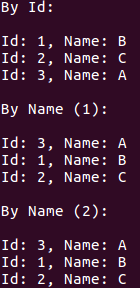Custom Comparison for Associative Container
For STL associative containers, the type of keys stored must be comparable. Although in some cases you might want to supply an alternative comparison function.
To use the associative containers provided by the Standard Template Library (STL), the type of keys stored must be somehow comparable.
For ordered containers (e.g std::set<T>), the comparison of elements of type T is by equivalence,
which, roughly speaking, means overloading operator< for T. And for unordered containers (e.g std::unordered_set<T>) the comparison is by equality, which in, again roughly speaking, means overloading operator==.
Nevertheless, for some instances of a container, we may want to supply an alternative comparison function that makes more sense for that single container instance.
For example, given a type Person that would normally sorted by Person::id, for some std::set <Person> called names we may want to compare the elements by Person::name, instead of Person::id. How do you “override” the default comparison function of Person for this particular instance of std::set <Person>?
The Complete Declaration for Associative Containers
To exemplify the concepts, I’ll pick up std::set as a representative of the
STL’s associative containers, albeit differences between it and others, aren’t significant for our goal, which is how to create an associative container with a different comparison function than the one defined by the type of element held inside the container?
According to cppreference, the complete declaration of std::set is:
template<
class Key,
class Compare = std::less<Key>,
class Alloc = std::allocator<Key>
> class set;
Where:
Keyis the type of elements held in the container.Allocis the memory allocator, with the default beingstd::allocator<Key>.
And the most important piece for us:
- Compare is the type of comparison used by the container, which defaults to
std::less<Key>.
Now, what’s std::less<Key>?
std::less<Key> is a function object that expresses the “less-than” operation on objects of type Key. And it does so by calling operator< overloaded by the type Key to check the relative order of two objects A and B of type Key like A < B.
Given the declaration of std::set, we see that the way to provide our desired behaviour is to supply a different type of comparison function
object for the template parameter: Compare. Alright? Let’s do it then!
Our type Person might look like this:
The use of Person inside std::set and comparing by Person::name, instead of Person::id can be done by:
Firstly, we created a variable peopleById that uses the internal (default) comparison function for types Person: Person::id(). Thus, every element inside the container will be sorted based on its id.
Then, at (1) we created peopleName that relies on the function object PersonCompareByName as the argument for the template parameter Compare, establishing the comparison by Person::name().
At (2) we achieved the same behaviour of (1), but employing an alternative syntax that uses a lambda expression personComparator and supplied its type to the template parameter with decltype.
Finally, the output of the program should be similar to:

Conclusion
Sometimes we may want to supply alternative ways to sort elements of associative containers, other than the one defined by the key part of the
element (i.e. T::operator<), but the custom behaviour may be wanted for only a particular instance of the container. This text has shown a way to achieve the intended behaviour, by providing two different syntaxes to achieve the same result.
STL has a vast collection of algorithms and containers that simplify our daily programming tasks in C++, with highly flexible and optimized solutions. Therefore, I encourage you to search for more information and whenever possible, favour STL components in your projects rather than home-made solutions.
References
[1] http://www.cplusplus.com/reference/set/set/
[2] http://www.cplusplus.com/reference/functional/less/
[3] Effective STL. Scott Meyers.
Originally published at https://medium.com/@rvarago